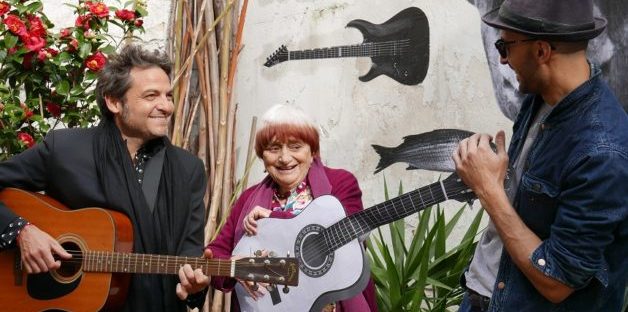Review: Faces Places is an insightful documentary which gives voice to the working class
- Directors Agnès Varda and JR travel round rural France meeting locals and posting their faces on sides of buildings
- Screenings at Home until 8 October
Faces Places is a is a 2017 French documentary film directed by Agnès Varda and ‘JR’ that depicts the directors travelling around rural France, creating portraits of the people they come across.
It is a heart-warming film and the way Varda and JR interact with each other feels natural and inclusive to the point where the audience feels part of the conversation.
Faces Places is about ordinary, working class people. We meet postmen, farmers, miners, baristas, young people and the retired. In an early part of the film, Varda and JR travel to an old mining village where they plaster photos of miners on the walls of terraced houses.
Then, to honour the last woman living there, they plaster her face over her house. Her reaction is heartfelt and tear-jerking.

In every village they visit, Varda and JR place villagers centre stage. In their portraits, you can see their personalities and life stories. Each segment shows a slice of life into the village, and they all have one thing in common: community.
The film is melancholy in places: Varda and JR talk about death and a joke from Jean-Luc Goddard is taken badly. Nevertheless, the duo always approach villagers with kindness. When interviewing them, the duo are out of shot, giving villagers centre stage and letting the audience see them fully.
The most heart-warming moments of the film are when villagers see the images for the first time. Most of the time they react positively. A barista in southern France is initially uncomfortable with her picture being on the side of a wall, but her children speak about it with pride.

Faces Places celebrates life, looking at the very young and the very old, as well as to the past, present and future. It also celebrates the life of animals: Varda and JR post fish onto a water tower and a debate is sparked over whether or not goats should have their horns burnt off.
The film also shows people’s vulnerability. The barista is initially hesitant to have her photo taken. JR sees his trademark fedora and sunglasses as his ‘costume,’ and is vulnerable without them.
Varda, who was 88 at the time of filming, knows that her eyes are failing her. Her eyes and feet are plastered onto the side of a train so that they can travel and see the parts of France that she cannot.

In the most vulnerable parts of the film, Varda and JR sit in front of a river and talk about Varda’s late husband, Jacques Demy, as well as her friends who have died before her and the people that she is starting to forget.
Faces Places is touching and tender and treats its subjects with respect. You can clearly see that a lot of love and care went into every aspect of the film. It celebrates and loves the ordinary, working-class people of rural France.
Showing at Home


